“Love sets up resonances in the deepest abysses of our being. It is a lightning flash of the eternal within the flow of time.”
Aldo Carutenuto, Eros and Pathos: Shades of Love and Suffering
Butterflies are very popular funerary motifs. The soul is like a butterfly (“Psyche” in Greek): short-lived and attracted to Light. Love and Death, Eros and Tanathos, are closely connected: in love an individual self is obliterated through merging with the beloved. Love brings mortal wounding, suffering and agony, which reminds me of a somewhat disturbing quote from one of Franz Kafka’s letters to Milena: “You are the knife I turn inside myself, this is love. This, my dear, is love.” From the heights of bliss to the depths of despair: that is Psyche’s way in the myth. Through death, which is an organic and symbolic part of life, she is born into eternal life by undergoing tests, purifications, death, resurrection, and ascension. “Death is the translation of life into soul,” beautifully wrote James Hillman in Animal Presences. Psyche is both mortal and immortal.
The last part of the story, in which Psyche has important tasks to fulfill, shows the making of her Self. In the previous two parts of the series, with a knife and a lamp she cut through the sensual oblivion of living in the belly of the uroboric monster and embarked on a journey towards separateness and consciousness. Her goal is merging with her beloved Eros but to be able to form an alchemical union with him she has to first become an individual psychological entity.
The angry and wounded Eros abandons Psyche and life loses its meaning for her. Without Love the Soul has no reason to live and she contemplates suicide. The story continues in Psyche’s Knife:
“Psyche believed that all was lost. She left the palace and threw herself into the river, but the river, fearful of offending Eros, bore her up and carried her to the opposite bank. There Psyche encountered the god Pan… When he saw the forlorn girl, he immediately knew that she was suffering the pangs of love. “Do not try to kill yourself,” he advised, “but go instead to the god of love and plead with him.
Edward Burne-Jones, Pan and Psyche
Psyche left but she wandered aimlessly. After a time, she found herself in the kingdom where one of her sisters ruled, and so she sought an audience with her. ‘I did as you advised,’ Psyche told her, “and discovered that my husband was none other than the god of love. He abandoned me with bitter words and said he knew that he had married the wrong sister. Now he means to make you his bride.’
Psyche’s sister was overjoyed by this news. She ran to her husband, inventing some excuse for her sudden departure, and then quickly made her way to the rocky promontory where the West Wind had twice carried her safely to Psyche’s former home. The sister leaped into the air, eager for the arms of Eros, and fell to her death on the crags and boulders below.
Psyche wandered on and came to the kingdom of her other sister, whereupon Psyche related the same story. This sister … met the same violent fate.”
In Asteroid Goddesses, Demetra George says that Psyche archetype is connected with psychic sensitivity, especially towards the mind and feelings of another, but also with being able to feel and communicate with nature. The meeting of Pan by the river is very significant. Pan is the faun, the god of the wild, the horned deity known for his sexual powers. Nature takes Psyche under her wing: every soul on the path of individuation is cherished by Nature. That scene is the making of Psyche in the sense that it shows her connection with Nature because the soul’s separation from nature is an illusion of the mind. By throwing herself into the river Psyche agrees to let go of the obsessive and patriarchal need to control the natural flow of life and time. She lets herself be guided by archetypal powers – Nature, the current of Life, and the gods and goddesses (our inborn archetypes). She is now grounded in Nature and ready to evolve spiritually.
What she did to the sisters may sound cruel, but from a symbolic standpoint is necessary: the relationships that do not feed our souls need to be eliminated, however harsh that may sound. As Jesus said, “I do not come to bring peace, but to bring a sword. For I came to set a man against his father, and a daughter against her mother, and a daughter-in-law against her mother-in-law; and a man’s enemies will be the members of his household.” (Matthew 10: 34-39). Or as Emily Dickinson put it so beautifully: “The soul selects her own society. Then shuts the door.” After this purification, Psyche is now ready to meet the wrathful Aphrodite. She visits Demeter and Hera first to buy some time, but gets no help from either of the goddesses. Gods are demanding: you cannot substitute one for another, they all demand your worship.
“Aphrodite attacked Psyche, tearing her clothes, her hair, and striking her again and again. “Where is your beauty now, worthless girl? Do you have any strength, or value, or perseverance left? We shall test your mettle and see!”
Don’t we all sometimes feel lashed by the goddess of love? Psyche is tortured by Aphrodite’s two maids, Melancholy and Sorrow; after some time the goddess proceeds to assign Psyche four impossible tasks:
“In the center of the floor was an enormous heap of mixed seeds, barley, millet, and other grains, which Aphrodite commanded the girl to sort by nightfall. … Psyche sat down, bewildered and forlorn, not noticing her first helpers. An ant, followed by thousands more, crawled towards the seeds. …they sorted the entire heap into many separate mounds.”
The first lesson of the soul pertains to humility and industry, patience and determination. Ants remind Psyche that she should relinquish her sense of being special; also Aphrodite’s scorn had served the same purpose. Separation is an important stage of the alchemical process; it demands discernment and good judgement to separate the wheat from the chaff.
The next task consisted in collecting the fleece of ferocious golden rams, whose force and cruelty was the strongest at noon. Psyche was offered assistance by a green reed:
“Psyche, do not approach the rams directly. … Later, when the sun begins to set, go to the meadow where the rams have grazed and collect the bits of fleece caught on the low-hanging branches.”
Psyche is successful again thanks to achieving a taoist mindset, being at one with nature, not confronting the ferocious solar beasts openly but by gently collecting their treasures under the soft light of the moon. Neumann sees this labour as bringing fruitful contact between the masculine and the feminine, between solar and lunar consciousness.
“Symbolically, the sun emanates its light and projects its creative energy outward. The reflective quality of the moon returns the light back toward the source, thereby completing the soli-lunar circuit.”
Demetra George, Asteroid Goddesses
The third task is even more daunting:
“Aphrodite handed Psyche a delicate crystal flask. “Take this and fetch me water from the river Styx.” Psyche was aghast. She knew that its waters were poisonous even to the gods. With dread, she walked toward the place where the fierce waters tumbled over a sheer cliff into a deep gorge below… At that moment, Zeus’s eagle took pity on Psyche, swooped down and grasped the flask in his talons. Skimming gracefully next to the deadly water, the eagle filled it and returned the flask to the girl.”
The river Styx (“the river of hate”) was the boundary between the Earth and the Underworld. All the gods used to swear their oaths by it. On her path, Psyche is now integrating the archetypally masculine energies symbolized by the eagle: a solar bird of consciousness. Eagles are the opposite energy to the energy carried by the river Styx: thus this labour entails the unification of opposites. In connection with eagle symbolism, Cirlot shares an interesting thought in his Dictionary of Symbols: “… the constellation of the Eagle is placed just above the man carrying the pitcher of Aquarius, who follows the bird’s movement so closely that he seems to be drawn after it by unseen bonds. From this it has been inferred that Aquarius is to be identified with Ganymede, and also with the fact that even the gods themselves need the water of the Uranian forces of life.” The higher Aquarian waters of pure understanding are juxtaposed with the murky, toxic waters of hate flowing in the Styx. Both streams reflect the mysteries of Life and Death, as the whole myth of Eros and Psyche does.
Aphrodite did not relent and gave Psyche her last, the most formidable task. It is the fourth task, a number that Jung especially cherished: a number of completion. The mandala, the most perfect symbol of the Self (the unity of consciousness and unconsciousness) is divided into four parts. It is an image of a stable, eternal order. Also, Jung postulated that the male holy trinity needs the female fourth figure to achieve depth and wholeness, to unite the above with the below. Four is the number of matter (mother), the earth, the material manifestation.
“Psyche’s fourth and final task was beyond compare: she was to go down into the underworld and collect a beauty ointment from Queen Persephone. Psyche was well aware that no mortal ever returned from such a journey… In despair, Psyche spied a tall tower and again planned to kill herself. But the tower took pity on her and offered this advice: enter the underworld prepared with two coins for the ferryman and two honey cakes for Cerberus, the three-headed dog who guards the gates. “All along the journey,” the tower warned, “there will be lures to keep you from your purpose. You must resist each one. Above all, do not open the ointment from Persephone, for it will be deadly to you.”
A. Zick. Psyche and Charon
The tower is the first “non-organic” advisor to Psyche. It may stand for human culture and wisdom, symbolic of ascent. It is a symbol of wholeness because it is both masculine (phallic) and feminine (an impregnable fortress). It denotes self-imposed restrictions: it gives Psyche very detailed instructions which must be followed to the letter. The underworld can only be navigated with a steadfast and focused attitude. The lures that tempted her were a man whose bundle of wood had tumbled from the back of his donkey, who asked for her help; later a corpse floating on the surface of the river Styx lifted a cold hand, pleading for help. Psyche showed restraint and resolve and did not allow herself to be distracted. She knew her resources were limited and she did not squander them. She refused to dine with Persephone and made her way back with the ointment in her hand.
In ancient Greek mysteries, only those who ritually descended into Hades could be called full initiates. A collection of descent myths passed on to us is very rich: my favourite being Inanna’s descent into the Underworld ruled by her sister, Ereshkigal. The descent was prominent in Orphic mysteries as well: the original descent story being of Orpheus coming down to Hades to claim his wife Eurydice. We know very little about these fascinating ancient mysteries but what happened was probably that the hierophant was guiding the initiates into trance and through an out-of-body spiritual experience. The ultimate purpose was to lose all the earthy attachments and overcome the fear of death. The realm of Hades hides enormous riches: the new possibilities to turn our lives around, to experience rebirth and renewal, to rejuvenate ourselves by finding the greatest treasure. We descend to retrieve the lost splinters of our Self.
Paul Alfred Curzon, Psyche in the Underworld
Psyche emerges from the Underworld and the story continues:
“Then Psyche paused. She considered the jar of ointment and lifted a hand to caress her own careworn face. “Why should I simply give this to Aphrodite?” she wondered.” Why not use some of it myself, to recover my beauty so that my beloved Eros will be irresistibly drawn to me?” With that, Psyche opened the jar – and immediately fell into a Stygian sleep. At that moment, Eros felt something stir. … He scanned the landscape And, spying the sleeping Psyche, Eros kissed her awake…”
Edward Burne-Jones, Psyche Opening the Box
Antonio Canova, Amor and Psyche
Edward Burne-Jones, Eros Delivering Psyche
He flew to Mount Olympus and professed his love. Psyche was accepted among the Olympians as the new goddess. Shortly after their child was born, a girl whose name was Pleasure (Joy).
In all interpretation of the myth that I have come across Psyche is scorned for her “narcissistic” wish to be beautiful for Eros. But I think we can look at what she did form a symbolic standpoint: the soul wants to purify itself and be beautiful to in order to merge with the Beloved (understood as God, like in Sufism or Christian mysticism). She is a drop that longs after the ocean.
We can also view the myth from an alchemical perspective. The alchemists, in their quest for gold (understood as the highest unity of body, mind and spirit and the actualization of the Self) considered the world to be governed by a myriad of paired forces (opposites). They perceived the Soul to be an organ of the Spirit and the Body an instrument of the Soul. Their goal was self-knowledge and they sought to harmonize and balance the opposing forces first within themselves and then to project that inner order on the outside world. The child of Eros and Psyche is the fruit of such a union, it symbolizes the loving centre of our being. To me, Psyche is heroic but not in a traditional, patriarchal sense. She completely redefines the heroic. As Eric Neumann wrote in Eros and Psyche: “She can stand up to the disintegrating power of the archetypes and confront them on an equal footing. Yet all this does not occur in a Promethean-masculine opposition to the divine, but in a divine, erotic seizure of love.”
Paul Baudry, Cupid and Psyche
Sources:
Elizabeth Eowyn Nelson, Psyche’s Knife: Archetypal Exploration of Love and Power
Erich Neumann, Amor and Psyche
Related posts:

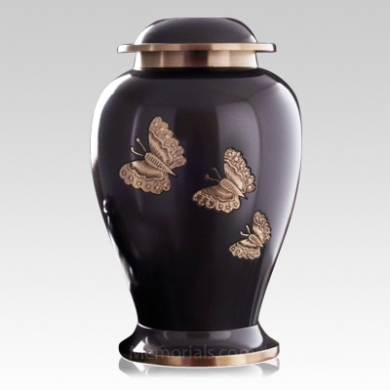
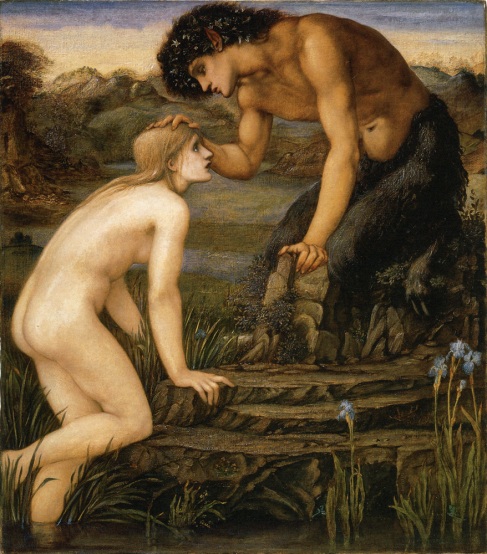
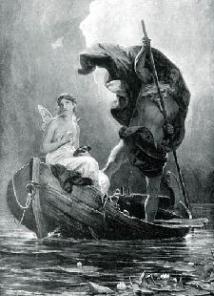
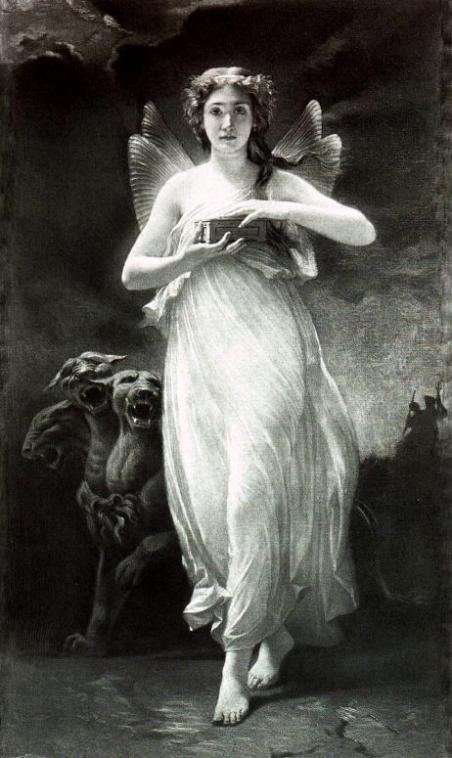
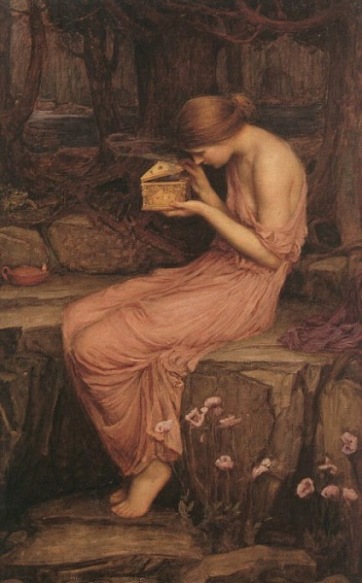
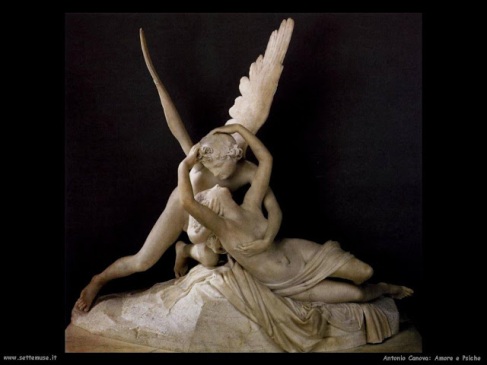
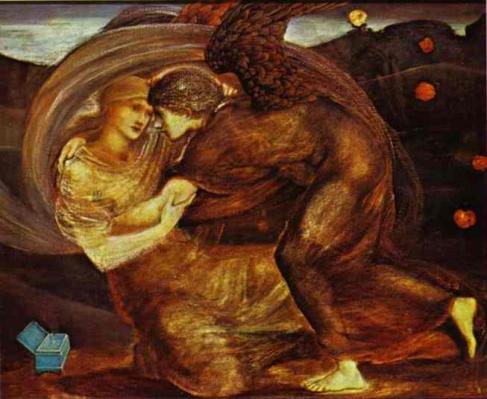
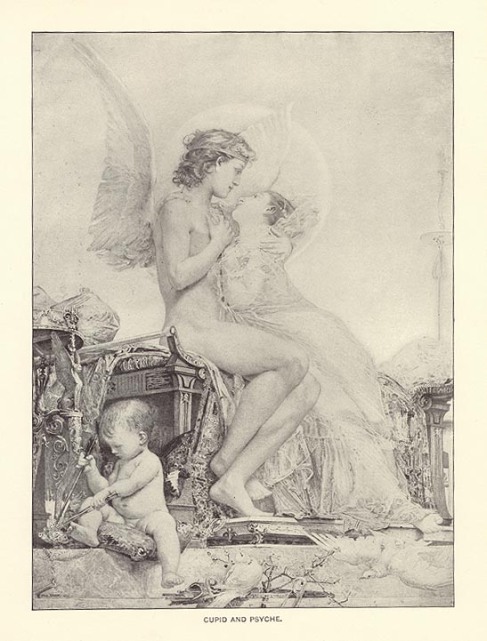






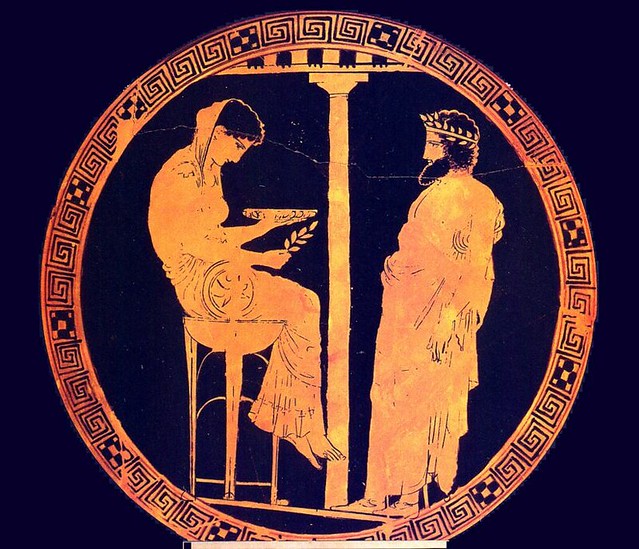




The images are absolutely superb and the account so powerful. Even as I was reading my mind was opening up to so much. I just don’t know how some scholars can speak of us entering an age void of myth.
“Her goal is merging with her beloved Eros but to be able to form an alchemical union with him she has to first become an individual psychological entity.” I so warm to this because for me true union cannot take place without this kind of differentiation, or as Jung would have it, individuation. Another great post Monika – thank you.
LikeLike
That makes me very happy, Don, and I really think these mythical stories are very, very much alive.
LikeLike
Wow! Thorough and insightful. And I agree with yours and Don’s comments about mythical stories still being alive. I’m reminded of a quote from a TV show: “Gods come and go, but the myth is eternal.” Thanks for your post!!
LikeLike
That is a nice quote, Jeff. Thank you very much.
LikeLike
psyche the drop that merges with the supersoul the ocean – wonderful – all hindu ‘bhakti’ poets sought to bring this out as amny of the poems of Surdas, Raidas, Meera and Tulsidas vividly show – if some uninitiated person were to read them he would believe they were songs of earthly eternal lustful longing – but as you rightly say the universe is indeed ‘erotic’ and our minimal( hehe) eroticicism which we think is the source of all eroticism, is but a reflection of the universes grand eroticism which provokes spiritual ecstacy of Meera, Sur, tulsi Kabir, Rai, Bule shah, Nanak,and so many other mystical poets of India – do go read them on my post if not already done – superb post, yours.
LikeLike
I have read some of your posts featuring these poets – they are really wonderful. Thank you so much for yet another impressive comment.
LikeLike
This is a brilliant series. I love how much time you have taken with the story, teasing out the rich and poetic meaning for us. Thank you.
I think Psyche’s journey is, astrologically, one of the Moon and Venus, as you say. It is the anima’s path to wholeness. I also see a strong link to Neptune as well, another feminine archetype (in the connection to the sea, the collective unconscious and all that is binary opposite to the solar sense of ‘self’). With Neptune there is a giving up, a letting go, and Psyche, in the first three of her assigned tasks, gives up so that the task is accomplished without her lifting a finger. The ants and reeds, interestingly under the rule of Venus/Aphrodite, do the work, as does the eagle, Jupiter’s bird and, as you say, a masculine symbol.
The Tower, in its both masculine and feminine embodiment, instructs Psyche for the final task, but she has to carry that one out herself. In the end, she ‘fails’ which is the ultimate letting go, and necessary as it allows Eros to take action and, for the first time, really participate in the creation of their union.
The ‘kissing her awake’ is a theme in many fairy tales. I would love to hear your thoughts on that symbolism. Have you written on this topic? I shall search your blog!
Thank you again for sharing your deep insights.
LikeLike
Thank you very much, Kim. I think I have not written about kissing yet but you are right it may be a worthy subject. Would you believe I felt I could actually go on and on about other symbols that I have probably missed. It is such a rich story. And thank you for bringing in the astrological symbolism.
LikeLike
Great post on a great myth Monika! Very rich…
I love so much about the story and your telling of all that Psyche, or soul, must go through to find Eros, the beloved, including a bit of rebellion by deciding to ignore Aphrodite’s warning and use the ointment anyway!
Without seeing beauty in Psyche, we might miss our delight in her, and in our souls, aiming our love elsewhere. I think when love of soul, or a soul in love with the world is primary, every aspect of human existence is enlivened.
LikeLike
Thank you very much. I do believe it is the most beautiful story of love – our very own, Western Shiva and Shakti myth.
LikeLike
This is one of my favorites from you by far. Excellent.
LikeLike
:-* Love you, thanks.
LikeLike
I did not know the story and you told it beautifully, drawing me in with luscious images and an array of sources that provided variety and depth. Are you familiar with the band Styx? One of their albums is called Grand Illusion. I bet I know where they got there name.
I am displeased with the myth though, not the messenger! She betrays her sisters, succumbs to vanity with the ointment and is rescued yet again by a man! I liked her better in Part 2 Monika!
Oh well, I will stick with Chiron and Ceres for now , and perhaps add Lilith, Hermes and Eros ( since he is on my descendant). I just do not like women to be shallow, conniving victims.
Forgive my rant, the writing was impeccable 🙂
LikeLike
Many interpretations I’ve read say something similar and in Psyche’s Knight the author even attached her own version of the ending! But I am more inclined to see the myth not as a conventiinal, earthy love story but as allegory of the soul’s initiation into the deepest mysteries and the soul’s merging with the divine – a drop going back to the ocean it came from in the first place. Love is the creative force, the ultimate soulmaking force. I REALLY loved what Indrajit said in the comments to the second and the third part. I think it is our own, western mystical story.
LikeLike
Hi Linda — I’m confused. How can a someone be conniving and a victim all at once?
LikeLike
why not? many who play victim are conniving and/or manipulative at times. I think the ego plays a part in how we cope and make choices. Besides, I was not doing a character analysis of Psyche, I was describing my observations of her behavior as detailed in this version of the story. People and goddesses are complex and often contradictory. I know that I am 🙂
LikeLike
Hmmm… It seems to me like a distinction should be made between playing the victim and being victimized. And in the case of Psyche, it seems like she was. The way she kills her sisters… how was that a betrayal on her part? Weren’t they trying to marry her ex after tag teaming her with doubt earlier? Seems cathartic that she kills them to me. Psyche was victimized, and then she rose up!
LikeLike
Great, enriching, fascinating post… lots of information and depth to the symbolism of these myths I would never have uncovered on my own… thank you so much for sharing your knowledge and insights… what a journey 🙂
LikeLike
Thank you very much, Heidi!
LikeLike
Thanks Monika for having exposed me to so many fascinating references in this series… I am still in the process of digesting.
Cheers,
Michal
LikeLike
Michal, thank you for your thoughts. This myth has been on my mind for a very long time, I think it is incredibly complex and rich; I hope I have managed to convey at least some of my fascination.
LikeLike
Sure. I totally acknowledge your talent at both choosing and ordering the a fore mentioned references and I envy 🙂 your talent at making such a complex and rich subject seem effortless (flowing) and compelling. I like your style, I can feel the passion!
LikeLike
Thank you very much!!
LikeLike
Ah! Finally I get the chance to read your post. That was a beautiful series and helped me understand Jungs individuation process. Loved it! 😀
LikeLike
Thank you, Shree, I am also very much behind reading other blogs, I’ve been so busy recently. Hugs,
Monika
LikeLike
Pingback: Venus Retrograde in Capricorn | esoteric embers
Pingback: Bound in Pisces: Psyche and Eros, Venus and Mars | Gray Crawford
Pingback: I Love you | westernimpression
Hi Monika, I loved your thoughts about the story. You wrote this the year I discovered the myth, and I can’t believe I’m just finding your posts! One of my pet peeves with the Jungians is their assumption that Psyche “failed” when she lit the lamp or opened the box. I see it as an act of rebellion spurred on by love. The lamp was for the love of her unborn child and the box was “to when the grace of love” but mostly it was about stepping into her power, her sovereignty, whether she realized it or not.
My desire lately has been to peel back the myth – what were the meanings for readers before the Jungians got their hands on it, before the alchemists used it to explain alchemy’s stages (loved Martin Lowenthal’s Love and the Soul and that one is my bible!), before the mystery schools incorporated it into their teachings – Apuleius has the old woman who tells the story call it an “old wive’s tale”; so just how old was the oral tradition and what were the meanings then? We may never know but I like to imagine that it was told to young priestesses of Aphrodite to help them understand their initiation process and what that meant. That they were recognized like Psyche was by Aphrodite as a “great and powerful Sorceress” (It took me years before realizing Aphrodite was giving Psyche her reason for being in the role of Great Goddess/Mistress), that they were on the path to experiencing Divine Beauty both within themselves and by encountering Source, and that ultimately they would experience union with Love and birth Pleasure.
In blooming, Lori
LikeLiked by 1 person
Dear Lori, thank you for all your thoughts. I try to follow my instincts when interpreting myths and one thing I always believe is that we cannot scorn characters from our limited perspective. I only seek to understand – I just felt it was the right thing to do to open that box. It definitely was about claiming her own power, as you say. I have not read the book by Lowenthal that you mention but I hope to. I wrote that post when my life was at a crossroads and I very much identified with Psyche. It was a healing experience to ponder on the myth.
Thank you very much for your comment
Monika
LikeLike
I am so happy to have come across your brilliant piece! It was serendipitous for me–I am doing a Psyche illustration for an online art course and was looking for symbols to include. But what a fantastic discovery! I am very interested in the myths since I’m writing an essay that involves mysticism. Yours is one of the best and most interesting accounts I have come across about Psyche and the inner journey. The above comments from others are also fascinating. Thank you so much!
LikeLiked by 1 person
Thank you! That is really fantastic. I wrote this at a pivotal moment of my life. It is indeed an enduring myth of soulmaking.
All the best with your project
Monika
LikeLike
You have wise and deep understanding of the underlying meaning of the mythos, as well beautifully worded explanation of your insights truly the making of a modern day philosopher
LikeLike
Thank you. I deeply appreciate this.
LikeLike